Trump Calls Biden Admin 'Stupid' For Letting Russia, China Lead Iran Talks
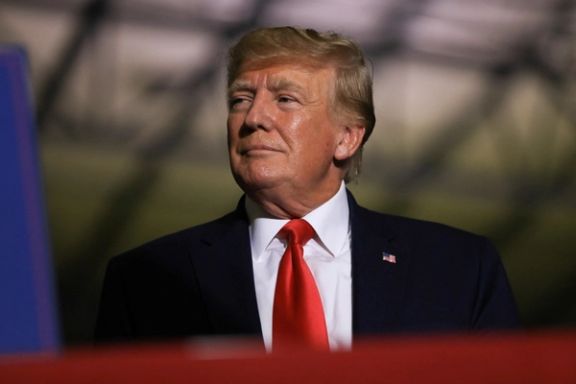
Former President Donald Trump has criticized the Biden administration for allowing Russia and China to negotiate on behalf of the United States to revive the 2015 Iran deal.

Former President Donald Trump has criticized the Biden administration for allowing Russia and China to negotiate on behalf of the United States to revive the 2015 Iran deal.
Addressing a crowd of his supporters in Washington Township, Michigan, on Saturday, Trump said Biden is not even reviewing the new nuclear deal and has let Russia and China to lead the Vienna talks, calling it “stupid”.
"So, we have Russia negotiating the deal – with China as a backup – how stupid is this country. They are so stupid”, he said, adding that “the deal is turning out to be a disaster. Nobody can even believe it. But we're giving everything away – all the things that we fought for with Iran."
Trump, who in 2018 withdrew from the Obama-era deal -- officially known as the Joint Comprehensive Plan of Action (JCPOA) -- and imposed ‘maximum pressure’ sanctions, added that his administration would have made a new agreement. "Within one week after we took office, they would have made a deal. They were so ready to make a deal."
He slammed Biden’s policy toward Iran, saying, “We had all the cards. We still have cards – if they knew how to play them, they still have cards”.
Most of the Republicans and former administration officials denounce Biden’s policies regarding the Middle East and particularly Iran, however, Biden’s administration says Trump’s decision to abandon the JCPOA led Iran to intensify its nuclear program and aggressive actions in the region.
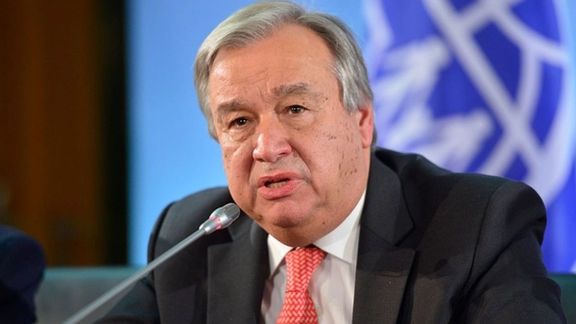
UN Secretary General Antonio Guterres called Iran’s Foreign Minister Hossein Amir-Abdollahian to congratulate Yemen’s ceasefire and discuss talks to revive the 2015 nuclear deal.
Guterres was quoted by the government news website IRNA as saying that the two-month ceasefire announced for Yemen on Friday “a mutual success”, achieved through efforts by all involved parties.
Amir-Abdollahian in turn thanked Guterres for his role and insisted that now is the time to take “fundamental steps” toward peace and stability in Yemen, specially removing sanctions that impact humanitarian aid.
Referring to a Security Council resolution condemning aggression by the Houthi rebels, Iran’s foreign minister expressed his disappointment. Tehran has been supporting the Houthis who have been fighting Yemen’s legitimate government and a coalition led by Saudi Arabia that has intervened in Yemen since 2015.
Speaking about nuclear negotiations with world powers in Vienna, Amir-Abdollahian told Guterres that “we are close to an agreement and have submitted our proposals over remaining issues through the European Union’s negotiator to the American side and now the ball is in their court.”
After one year of indirect negotiations with Washington, Tehran’s last major demand is for the US to remove the Revolutionary Guard from its foreign terrorist list. The Biden administration has not made a decision yet on the issue as opposition to such a move has been gaining ground among American lawmakers.
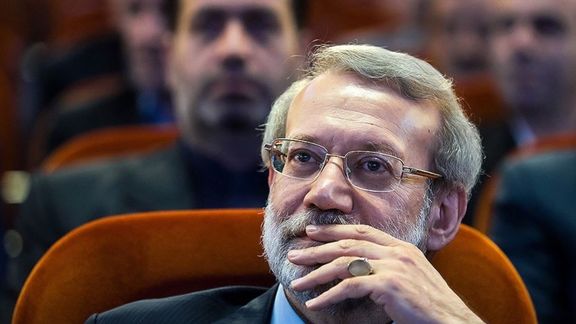
Less than two years before Iran's next parliamentary election, moderate conservatives are preparing to reclaim the political place they were denied since 2020.
According to news website Nameh News, different conservative factions have already started to compete within their camp and apparently there are at least three main players lined up for the February 2024 elections.
Moderate conservatives (such as Ali Larijani), ultraconservatives (Paydari and pro-Ahmadinejad groups such as most of the current members of the parliament), and current Speaker Mohammad Bagher Ghalibaf with his ‘neo-cons’ are the main factions.
Hardliner politician Seyyed Hossein Naghavi Hosseini told Nameh News that some of the conservative political groups have already organized election committees for their campaigns. However, he claimed that conservatives will take part in the election as a single front.
This has been their promise since 2007, but conservatives never managed to present themselves as a consolidated front in any election. This appears to be the case for 2024.
Nameh News wrote that even now, former Majles Speaker Ali Larijani is planning for the next election independent of other conservatives, adding that he has a good chance as most people believe he is a logical and capable person who can bring about a change in the country's politics.
The Raisi factor
Naghavi said that the next parliamentary election will be deeply affected by President Ebrahim Raisi's success or failure. People will welcome hardliner conservative candidates if they believe Raisi has been successful, otherwise they will opt to vote for others. He claimed that even now Larijani and his like-minded candidates enjoy support.
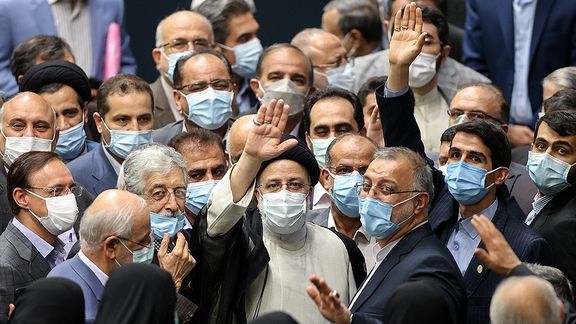
Larijani's political allies are also active players in the media and their main activity is criticizing the Raisi administration and the current parliament.
The politician argued that the main rivalry will take place between the Larijani camp and current Majles Speaker Ghalibaf.
Raisi, who was Supreme Leader Ali Khamenei's choice as president, so far has left a dismal record in managing the economy and the hardliner camp that has supported him might loose its value for the regime.
Reformists’ option is Larijani
Moderates and reformists may also be willing to take part in the elections, but it is still not known who will be leading them.
In another report, Nameh News pointed out that the situation has changed since Larijani was disqualified by the Guardian Council and barred from the 2021 presidential election.
The report added that Iran's moderates and reformists will also not be able to find any political ally and leader in the next election other than Ali Larijani. Meanwhile, even among the conservatives, there are many voters who would welcome the Larijani-led right-of-center faction to replace the far right "principlists" who currently control the Majles.
Even Iran's reformist analysts such as Abbas Abdi have backed the idea of Larijani becoming the leader of Iran's moderate conservatives. Nameh News quoted him as saying that "This is Ali Larijani and Iran's traditional conservatives' last chance to come back into the spotlight. Without a figurehead such as Larijani, that would be the end of the traditional conservatives who were side-lined in the 2021 presidential election partly for the same reason."
Some Conservatives might flip
Since his disqualification in June 2021, Larijani has tried hard not to create any controversy and has successfully evaded regime redlines, most importantly, turning against Supreme Leader Ali Khamenei.
In the meantime, as Nameh News has observed, what is certain, is that most current lawmakers are likely to turn against Raisi to distance themselves from his failures. They would want to make sure that increasing dissatisfaction with his performance does not ruin their chance of re-election. Some might even shift to Larijani's camp.
The fate of elections in Iran is determined by the conservative-dominated Guardian Council that can say who can and who cannot run in the fist place. But once the candidates have the Council’s and Khamenei's blessing, it is the man in the street whose votes they need.
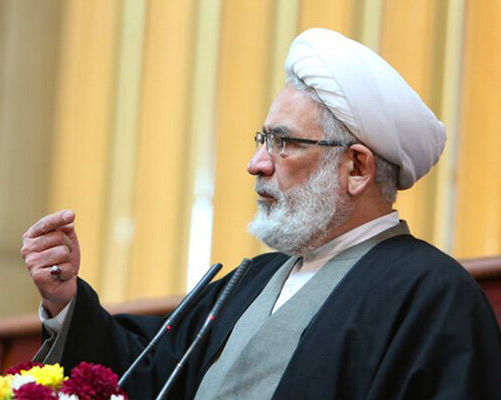
Iran’s prosecutor-general has called on the police to challenge those eating and drinking in their cars during daylight in the fasting month of Ramadan.
In a letter to the police commander-in-chief Hossein Ashtari, Mohammad Jafar Montazeri pointed out that vehicles are not private property, meaning that any eating and drinking inside cars in public places should not take place.
Ramadan fasting begins Sunday in Iran. It started Saturday, as expected, in Saudi Arabia, once the Ramadan crescent moon was confirmed Friday. The United Arab Emirates and Kuwait also declared Saturday as the first day of the lunar month.
Montazeri stressed that prosecutors across Iran should cooperate with, and support the police, in following holy month’s rituals and regulations. Foreign minister Hossein Amir-Abdollahian tweeted a wish that the holy month bring “mercy…to us and all peoples with goodness, tranquility and abundance.”
Fewer people have been observing the Muslim fasting period in recent years but police arrest and fine anyone who breaks the rules in public.
In addition to avoiding certain actions mentioned in the Qur'an, Muslims must abstain from food or drink of any kind from dawn to dusk, which will be about 14 hours in Iran this year.
Every year police enforce a national plan to deal with those who break Ramadan rules in public, and transgressors are sometimes sentenced to months of detention and lashes.
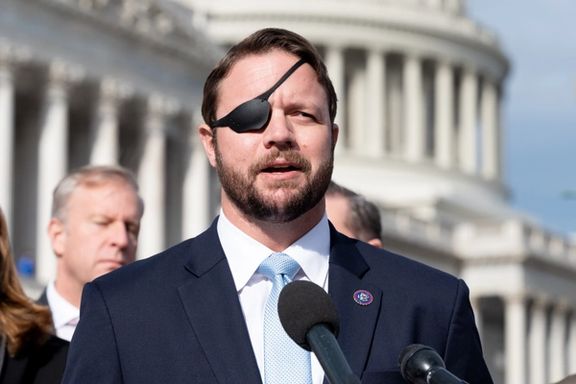
Dan Crenshaw, a Republican Congressman, said Iran understands only power and leverage, and the Biden administration was not acting rationally.
Crenshaw told Iran International Friday that the 2015 Iran deal, from which Republican president Donald Trump withdrew the United States in 2018, “was a danger to the Middle East stability.”
In opposing talks in Vienna between Iran and world powers to revive the deal, Crenshaw, an Afghanistan war veteran and a SEAL force commander, said the Biden administration should not be “engaged in negotiations when Iran is sending missiles into Iraq near our consulate.” Iran March 13 fired missiles at Erbil, northern Iraq, hitting a villa it claimed was used by Israeli intelligence, apparently in response to Israeli attacks on an Iranian air base in Kermanshah province or on Iranian forces in Syria.
Missiles
Crenshaw said that Iran’s Revolutionary Guards (IRGC) accepting responsibility for the missiles had been “bold and brazen,” and that the US was projecting weakness “over and over again.” This was the “worst way to negotiate,” he argued.
Earlier in the day, the Democratic Majority Leader in the House of Representatives Steny Hoyer told Iran International’s Arash Alaei that President Joe Biden saw limiting Iran’s nuclear program, as done by the 2015 deal, as “a critically important objective” and that Washington would continue negotiations with Iran and other world powers as long as agreement was possible.
The Vienna talks over reviving the 2015 deal − the JCPOA (Joint Comprehensive Plan of Action) – have gone on for a year, struggling to resolve which US sanctions contravene the agreement and exactly how Iran’s nuclear program, expanded since 2019, be returned to JCPOA limits. Among issues reportedly remaining, the US is refusing to rescind Trump’s 2019 move adding the IRGC to the US list of ‘foreign terrorist organizations,’ the only example of a sovereign state’s armed forces being so designated.
In a Friday statement, US National Security Advisor Jake Sullivan defended this week’s new US sanctions against Iran’s procurement effortsfor its missile program. “We will continue to use all appropriate authorities to hold Iran and its proxy groups accountable for threats against our friends and partners,” he said.
Yemen’s Ansar Allah, known as the Houthis, have in recent weeks, accelerated efforts to hit Saudi energy targets in response to the Saudi war effort in Yemen. Ansar Allah, who control most of northern Yemen, have developed a missile capacity, reportedly with Iranian help, over many years although the damage caused by the strikes is limited given Saudi air defenses.
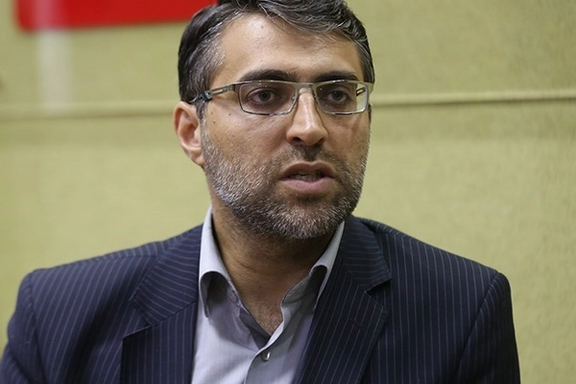
The general director of a major government pension fund in Iran says that around $400 million was lost either through mismanagement or embezzlement.
The official government news agency, IRNA, quoted Hossein Amerian, the newly appointed general director of steel industry pension fund that there are 800 investigations taking place to identify all those who are responsible for the losses.
The fund makes retirement payments to tens of thousands of people who worked both at government-owned and privatized steel companies. When the pension fund loses money, the government must step in and fill the deficit in addition to paying pensions of millions of former government employees such as teachers.
Because of the current economic crisis, triggered mainly by US economic sanctions since 2018, the government has been unable to regularly dispense the monthly pensions or adequately increase payments amid a 40-percent annual inflation rate.
Amerian explained that fund managers in the previous government of president Hassan Rouhani invested in money-losing government companies or simply engaged in corrupt practices that cost the pension fund 100 trillion Iranian rials or $400 million.
Officials appointed by President Ebrahim Raisi in recent months have claimed many cases of corruption by former managers, but it is not clear to what extent these are politically motivated. There have also been allegations of nepotism in the new administration, where newly appointed officials want to fire thousands of managers to appoint their own friends and relatives to lucrative posts.